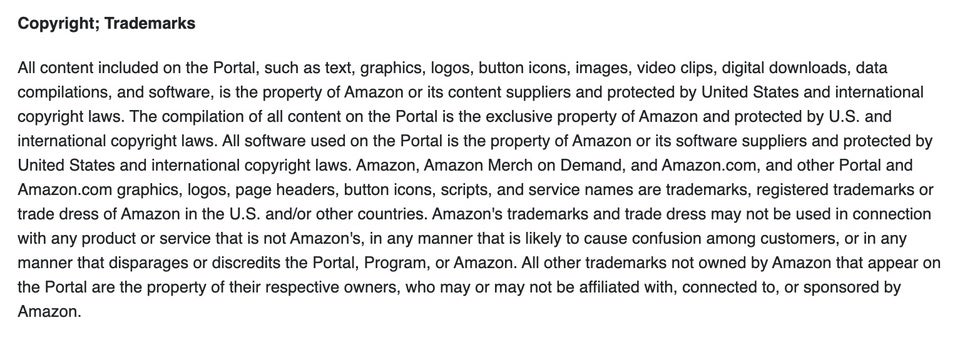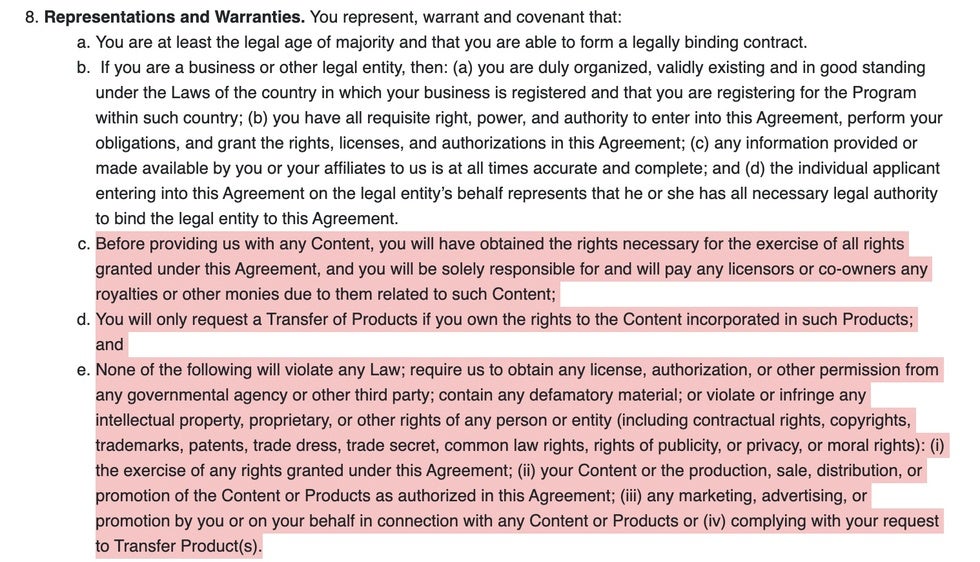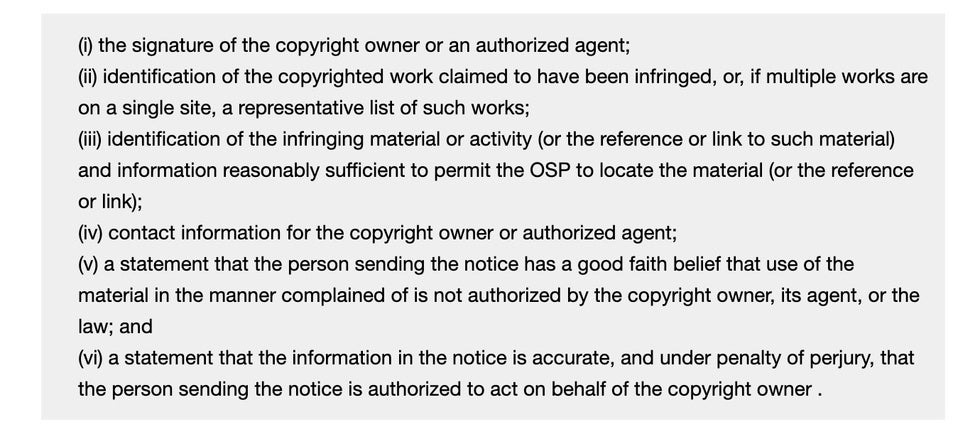Introduction
Amazon.com is an amazing company that offers people just like you and me an incredible opportunity to create an online store and sell your creative designs and products. They have two ways to sell:
- Merch print on demand (which allows users to upload product designs, for example), and Amazon will allow you to set the price and collect royalties. They do all the fulfillment and handle the customer support, which is incredibly useful and allows creators to scale up ("tier up") fairly quickly if they have "hot items" that people want to buy.
- Seller Central Account (this is where you can open an online store on their website).
In this blog, we are talking about account termination issues on the Amazon Merch Print on Demand ("MOD") service. This can happen, for example, where you receive a DMCA takedown notice and respond with a counter-notification, and then your account gets taken down shortly thereafter, in a potential act of retaliation, which is prohibited under 17 U.S.C. 512(g). What do you do as a seller when this happens? Should you appeal their decision? What if they don't respond? Should you arbitrate the case? Let's discuss.
Merch on Demand Terms of Use
You can find the Amazon Merch on Demand terms of servic here. Here are the key portions of this document related to possible grounds for account termination:
Abuse of the Portal legal issues

Empty heading
Intellectual property violations and infringement legal issues:

It is important for all sellers to review and understand these terms and to make sure to adhere to them. This is just their terms of service. Their TOS also discusses that the Merch on Demand Services Agreement must also be followed. Here are the key compliance elements to be aware of.
Amazon Merch on Demand Services Agreement—Key Terms
You can find the Amazon Merch Account Services Agreement here. Here are the key account compliance items to be aware of and follow. If not, this could lead to an account takedown.
False representations or failure to adhere
When you sign up and apply for the MOD account, you are agreeing to certain representations and warranties. If you violate these, or they are not true for you, then your account can be taken down WITHOUT NOTICE TO YOU (see below). Here are the representations and warranties:

Product description violations
Amazon sets certain requirements for product descriptions and compliance requirements.

Failure to adhere to the rules can lead to account termination (without notice or due process)

17 U.S.C. 512(g)—DMCA retaliation claims?
As you can see, there are many ways to fall into a compliance trap that can lead to an "out-of-the-blue" account takedown. Account takedowns can be appealed, and you may need to send them a legal request to reinstate your account. Another issue arises where a seller may receive a DMCA takedown notice alleging copyright or trademark infringement or a right of publicity violation (for example, selling Ozzy Osbourne or Taylor Swift T-shirts without permission or the legal rights), which can lead to the DMCA takedown and counter-notification process. (Video)
We are also aware of the situation where a seller receives a vague or uncertain DMCA notice from a complainant (which forces the takedown of the product), and which triggers the right for the seller to respond with a counternotice or counternotification (which puts the allegedly infringing or improper product back up within 10-14 days—unless the complainant decides to file a lawsuit within 10 days of receiving the counternotice). Many times, the original complainant will let it go in order to avoid filing a lawsuit that will likely incur legal fees and may raise defenses such as fair use. Sometimes, sellers receive takedown notices that don't even mention the complainant's name or the issue at hand. This can make it difficult to identify the claimant and have a chance to work out the dispute privately and amicably and perhaps seek a withdrawal of their complaint or find a way to obtain the proper licensing.
But what happens when the seller receives a takedown notice, but their counter-notice is NOT SENT to the original complainant (we have seen this happen on various social media and e-commerce platforms), or WORSE, Amazon just TERMINATES your seller account without notice or due process, as some refer to it?
NOTE: per their BSA agreement, there is no due process required (see above). Due process typically refers to rights people have against the government taking life, liberty or property.
Is Amazon allowed to just terminate you? Does a seller have any legal rights? Can you sue for retaliation?
Application of the DMCA
Online service providers (those sites and platforms that allow third parties to post content) would be subject to secondary copyright liability for infringing content posted on their website BUT FOR the DMCA safe harbors liability protection. OSPs routinely apply for a DMCA agent to receive takedown notices. Once the OSP receives a properly completed notice of infringement (called a "takedown notice"), the OSP, Amazon in this example, is required to forward the takedown notice to the Amazon seller. A properly completed notice must include (per the United States Copyright Office):

Failure to include these items may result in the OSP (e.g., Twitter/X, YouTube, Reddit, TikTok, Facebook, Instagram) not forwarding the takedown to the seller or user. The same applies to a counter-notification that fails to meet the legal requirements. If the takedown notice meets the requirements, Amazon would be required to forward the takedown notice as well as the counternotification and let the parties try to work it out, or not. At least there is an opportunity to try. Failure to do this by an OSP may jeopardize their safe harbor protection, and an aggrieved IP rights holder may want to file a lawsuit (or they may be bound to seek binding arbitration). At any rate, this is how things are SUPPOSED TO HAPPEN.
What happens if Amazon takes down your account after receiving a notice/counternotice and it feels like they are retaliating? Is there a lawsuit for retaliation? Let's look at a few of the relevant DMCA code sections:
17 U.S.C. 512(g)
This section states:
(g) Replacement of Removed or Disabled Material and Limitation on Other Liability
(1) No liability for taking down generally.
Subject to paragraph (2), a service provider shall not be liable to any person for any claim based on the service provider's good faith disabling of access to, or removal of, material or activity claimed to be infringing or based on facts or circumstances from which infringing activity is apparent, regardless of whether the material or activity is ultimately determined to be infringing.
(2) Exception.—Paragraph (1) shall not apply with respect to material residing at the direction of a subscriber of the service provider on a system or network controlled or operated by or for the service provider that is removed, or to which access is disabled by the service provider, pursuant to a notice provided under subsection (c)(1)(C), unless the service provider—
(A) takes reasonable steps promptly to notify the subscriber that it has removed or disabled access to the material;
(B) upon receipt of a counter notification described in paragraph (3), promptly provides the person who provided the notification under subsection (c)(1)(C) with a copy of the counter notification, and informs that person that it will replace the removed material or cease disabling access to it in 10 business days;
and
(C) replaces the removed material and ceases disabling access to it not less than 10, nor more than 14, business days following receipt of the counter notice, unless its designated agent first receives notice from the person who submitted the notification under subsection (c)(1)(C) that such person has filed an action seeking a court order to restrain the subscriber from engaging in infringing activity relating to the material on the service provider's system or network.
ANALYSIS: As you can see, this code section creates some requirements the platform provider needs to comply with to maintain safe harbor liability shield. However, no explicit prohibition against "retaliation" is mentioned in 512(g). So even if your account is disabled a day after filing a notice/counter-notice (perhaps Amazon is tired of dealing with you due to multiple infringements or issues that cost them time and money), retaliation is something that you would be required to PROVE in an arbitration alleging, as may be applicable, breach of the BSA agreement, unfair business practices, and bad fatih breach of the implied obligation of good faith and fair dealing for willfully and knowingly failing to follow the DMCA requirements. In an arbitration (see below), you can assert these claims and seek damages, and an injunction seeking to reinstate your account (see below). Good proof of retaliation would be an email to you saying to the effect: We will not be forwarding your request, have a nice day. Of course, this is not likely to happen, an having such broad protection to protect the integrity of their platform, and the right to play judge, jury and executioner, they will likely come up with a good faith argument as to why you were de-platformed. So, absent some strong evidence that rises about the circumstantial level, arbitrating may not be the best option. This is why a friendly worded letter is a good first step as outlined below.
Amazon Sellers Rights under DMCA law
Per the DMCA process, Amazon resellers should expect to have the following rights. This does not always mean you will get them.
- You have the right to a compliant takedown notice clearly stating what the issue is and meeting the requirements of 17 U.S.C. 512(c)(3).
- You have the right to have your counternotification forwarded to the proper party claimant and have your content restored (within 10-14 days) if the claimant does not respond with the filing of a federal court lawsuit and provide notice to Amazon. See 17 U.S.C. 512(g)(2).
- If you have a malicious competitor that likes to send false takedown notices for no purpose othen than to inflict damages, you have the right to sue them for filing knowingly false and bad faith takedowns/counternotices. See 17 U.S.C. 512(f) claims.
Amazon.com disputes must be arbitrated?
If you are upset with an account takedown decision, as noted above, you can file an internal appeal or hire an Amazon seller defense law firm that can write a detailed letter seeking reconsideration, reasoning, and reinstatement (as I call it "RRR"). However, if unsuccessful, your only legal recourse is typically arbitration.
Here is the Amazon Business Services Agreement ("BSA"), which covers sellers on the Amazon marketplace.
The Governing Laws will govern this Agreement, without reference to rules governing choice of laws or the Convention on Contracts for the International Sale of Goods. If the Elected Country is the United States, Canada, or Mexico, Amazon and you both consent that any dispute with Amazon or its Affiliates or claim relating in any way to this Agreement or your use of the Services will be resolved by binding arbitration as described in this paragraph, rather than in court, except that:
(i) either party may elect to proceed in a small claims court that is a Governing Court if your claims qualify;
(ii) you or we may bring suit in the Governing Courts, submitting to the jurisdiction of the Governing Courts and waiving our respective rights to any other jurisdiction, to enjoin infringement or other misuse of intellectual property rights; and
(iii) we may bring any claims related to your sale of counterfeit products on the Amazon Site in the Governing Courts or the court of your domicile or habitual residence and seek any remedy available under law related to those claims.
There is no judge or jury in arbitration, and court review of an arbitration award is limited.
However, an arbitrator can award the same damages and relief as a court (including injunctive and declaratory relief or statutory damages), and must follow the terms of this Agreement as a court would.
Before you may begin an arbitration proceeding, you must send a letter notifying us of your intent to pursue arbitration and describing your claim to our registered agent:
CSC 300 Deschutes Way SW, Suite 208 MC-CSC1, Tumwater, WA 98501.
The arbitration will be conducted by the American Arbitration Association (AAA) under its commercial rules. The expedited procedures of the AAA's rules will apply only in cases seeking exclusively monetary relief under $50,000, and in such cases the hearing will be scheduled to take place within 90 days of the arbitrator's appointment.
For all cases, the AAA commercial fee schedule governs the payment of all filing, administration and arbitrator fees.
The underlying award in the arbitration may be appealed pursuant to the AAA's Optional Appellate Arbitration Rules.
Amazon and you each agree that any dispute resolution proceedings will be conducted only on an individual basis and not in a class, consolidated or representative action.
If for any reason a claim proceeds in court rather than in arbitration Amazon and you each waive any right to a jury trial.
What to do if you are dealing with a DMCA issue as a Amazon seller
Here is a non-exclusive list of things to consider when faced with a content dispute:
- Look at the DMCA takedown notice. Does it meet all the requirements? If so, you need to review whether you have a good case to send a counternotice. For example, if they are alleging trademark infringement, is your content likely to cause consumer confusion (the trademark test for infringement), or whether there is substantial similarity (the test for copyright infringement) for example. Also, evaluate whether you have a fair use defense, a license, or you are using content in the public domain for example. If so, you can file a counternotification based on "mistake or misidentification."
- Don't forget, you can also contact the complaining party and try to work out the issue amicably, for example, explaining your fair use rights, or purchasing a license.
- If you determine your want to file a counternotification, make sure you meet all the requirements of a valid counternotice. If not, the platform may REFUSE to forward it, which can create problems.
- Assuming the OSP complies with the Digital Millenium Copyright Act, the complaining party must file a lawsuit within 10 days in order to keep the content down. If they do not, Amazon would be required to repost it, unless of course they have another reason for not doing so.
- If things are not resolved to your liking, you can submit an appeal. Please note, always keep your letters friendly and professional. Mean and thretening letters from an Amazon seller may lead them to conclude "we don't need these guys on our platform."
- Make sure you are not posting infringing content. For example, submitting designs that belong to a third party, or using trademark of third parties on your T-shirts, for example. Make sure you have the legal rights to post your content, and make it unique.
- Realize, account takedowns may be a simple mistake (bot-driven) and making a good case on appeal may be all you need.
- If an appeal internally to Amazon does not work, consider a legal request to reconsider the account takedown, and request additional information. Amazon, like other platforms, do not want to risk liability with people who do not know the law, or do not comply with the law, and who created continued and ongoing legal issues. Have a plan in place to make sure you are not infringing on third party rights.
- A request for reconsideration letter can also include a request to be paid royalties that were not paid, and if they won't pay them, or reinstate your account, you might mention you are willing to arbitrate if required, even though costs are typically involved.
- Always make sure to point out that you take intellectual property rigthts very seriously, and will make sure your content is unique, and that you have not otherwise dealt with any issues in the past, and perhaps note what a monetary asset your account is to Amazon.
Good luck out there. Happy selling!!